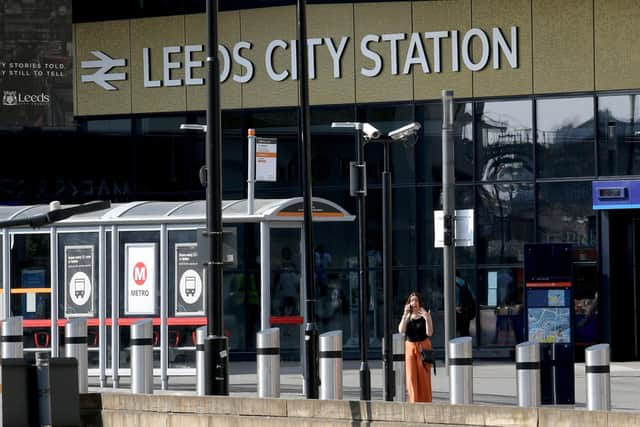Why there needs to be a committment to a vision for better railways in Yorkshire - Ben Still
The multi-billion pound Trans Pennine Route (TRU) upgrade is a massive, forward-looking investment. There is also the promise of electrification of the Calder Valley line from Leeds to Bradford, and improvements to the East Coast Main Line.
But despite these welcome investment promises, there is no hiding from the fact that we were disappointed when the Integrated Rail Plan (IRP) was finally published in November last year. Despite our best efforts to persuade, it fell short of fulfilling the new-line aspirations that we and our partners across the North had worked on over many years. New lines would have connected Bradford, Sheffield, Manchester, Birmingham, Hull, Newcastle, York and Leeds (to name but a few) with a railway fit for the future.
Advertisement
Hide AdAdvertisement
Hide AdInstead the IRP leaves unanswered questions, in particular regarding the expansion of Leeds station, which is rapidly being recognised as the national rail bottleneck for which there is no solution.


The Government has pledged funding to look at two aspects of this challenge. The first is how to get HS2 trains to Leeds. The second is whether mass transit solutions in West Yorkshire can alleviate pressure on the station.
While these are important questions, they fall into the trap of seeing rail planning as a series of discrete problems, with individual bespoke solutions. In fact, planning for the future rail growth of a station as important as Leeds needs to be holistic, based on a realistic assessment of the future demand, with a clear vision and strategy.
We are urging the Government to consider such an integrated approach in its plans for Leeds.
Advertisement
Hide AdAdvertisement
Hide AdOur vision for West Yorkshire is to be recognised globally as a place with a strong, successful economy, whereby everyone can build great businesses, careers and lives supported by a superb environment and world-class infrastructure.
The reason that rail improvements are so important is because of the vital role rail plays in sustainable economic growth, helping widen labour markets, improving agglomeration and increasing land values.
Our slow connections are replicated across the North and need addressing as a matter of urgency.
This will help deliver on the ‘Levelling Up’ agenda and, more importantly, enable people to get out of their cars and freight off our roads in order to make a positive contribution to a net zero carbon economy.
Advertisement
Hide AdAdvertisement
Hide AdBuilt as new lines, HS2 and NPR would have enabled faster and more frequent connections between Northern cities, with the former having provided an attractive alternative for the 41,600 commuters who travel on the M1 between Leeds and Sheffield. Critically, they would have left ‘breathing space’ on the existing rail lines for improved local and freight services, as well as better reliability.
It has now been over eight months since the IRP was published and the Government committed to a ‘study’ of how to get HS2 services to Leeds. As I write, we have still not seen the terms of reference for the study and no clear idea of the scope or potential route options. We can only hope it is launched with the full involvement of local and regional partners and a commitment to developing a solution that can be owned by both central and local Government.
In the meantime, we are getting on with improvements to the local rail network.
Work has begun on a new station at White Rose, between Cottingley and Morley and we’re developing plans for stations at Elland, Thorpe Park and a parkway station for Leeds Bradford Airport.
Advertisement
Hide AdAdvertisement
Hide AdWe are also working with Northern Rail to improve access and inclusivity at stations using funding from the City Region Sustainable Transport Settlement, as well as working with district partners to deliver improvements at Leeds, Halifax and Bradford.
To help West Yorkshire work more effectively and productively alongside our neighbouring authorities as well as building a stronger northern economy, the North requires frequent, faster, more efficient, reliable, and sustainable journeys to our neighbouring regions. West Yorkshire Combined Authority remains committed to this vision.
Ben Still is chief executive of the West Yorkshire Combined Authority.